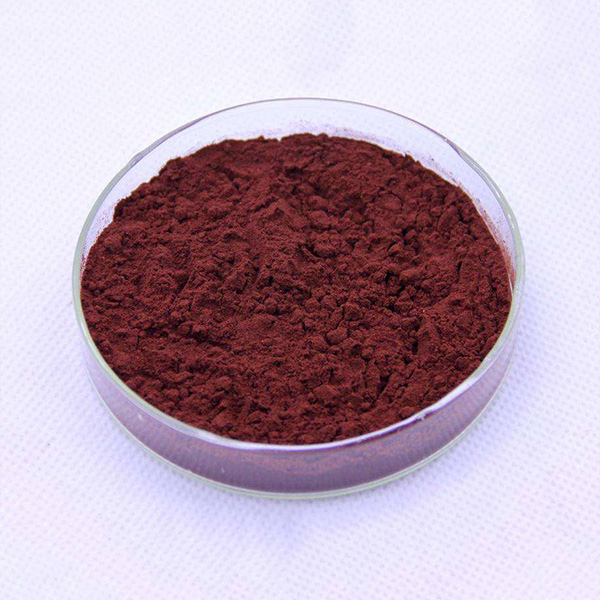High Quality Naturally fermented lycopene from tomato
Product Detail
Lycopene, a carotenoid found in plant foods, is also a red pigment. Dark red acicular crystal, soluble in chloroform, benzene and grease but insoluble in water. Unstable to light and oxygen, turning brown when met with iron. Molecular formula C40H56, relative molecular mass 536.85. The molecular structure has 11 conjugated double bonds and 2 unconjugated double bonds, constituting a straight chain type hydrocarbon. It does not have the physiological activity of vitamin A, but it has strong antioxidant function. The content is higher in the fruits of mature red plants, especially in tomato, carrot, watermelon, papaya and guava. It can be used as pigment in food processing and as raw material of antioxidant health food.
Health care products and sports supplements
There are 177 new supplement products containing lycopene worldwide, according to GNPD. The State Food and Drug Administration (CFDA) can find that there are 31 kinds of health products with lycopene as the name of National Food health, among which 2 kinds of health products are imported, and the others are all domestic health products. These 31 kinds of health care products are mainly used for anti-oxidation, anti-aging, strengthening immunity, regulating blood lipid, etc., among which 2 kinds are tablets, 1 kind of oil, and the rest are capsules.
Cosmetics
According to GNPD, there are 81 new skincare products and 51 makeup products that contain lycopene. Typical products, such as lycopene moisturizing lotion, have whitening and anti-aging effects. Domestic products include lycopene whitening essence daub needle, with anti-oxidation, anti-allergy, whitening effect.
Food and Beverage
In the food and beverage sector, lycopene has received "novel food" approval in Europe and GRAS status (generally considered safe) in the United States, with non-alcoholic beverages being the most popular. According to GNPD, there are 20 new products: seven in areas such as bread and breakfast cereals; 7 in processed meat, fish and eggs; 7 kinds of dairy products; 6 in chocolate and confectionery; 5 kinds of sauces and seasonings; 5 kinds of dessert and ice cream. Its application in dairy products not only keeps the nutrition of dairy products but also enriches its health function.
Application in meat products
The color, texture and flavor of meat products change during processing and storage due to oxidation. At the same time, with the increase of storage time, microorganisms, especially the proliferation of botulism, will also cause meat spoilage, so the chemical preservative nitrite is often used to inhibit the growth of microorganisms, prevent meat spoilage and improve meat flavor and color. However, research has found that nitrite can combine with protein breakdown products to form carcinogenic nitrosamines under certain conditions, so the addition of nitrite to meat has long been controversial. Lycopene is the main component of red pigment in tomatoes and other fruits. It has strong antioxidant capacity and good physiological function. It can be used as preservative and coloring agent for meat products. In addition, the acidity of tomato products rich in lycopene will reduce the pH value of meat and inhibit the growth of spoilage microorganisms to a certain extent. Therefore, it can be used as an antiseptic and preservative agent for meat and partially replace the role of nitrite.
Application in cooking oil
Oxidation degradation is a common adverse reaction in the storage of edible oil, which not only leads to the quality change of edible oil and even the loss of edible value, but also leads to various diseases after long-term ingestion of the degraded edible oil.
In order to delay the deterioration of cooking oil, some antioxidants are often added in processing. However, with the improvement of people's awareness of food safety, the safety of various antioxidants has been raised constantly. Therefore, the search for safe natural antioxidants has become a focus of food additives. Lycopene has superior physiological functions and strong antioxidant activity, which can quench singlet oxygen efficiently, remove free radicals and inhibit lipid peroxidation. Therefore, adding it to cooking oil can alleviate the deterioration of oil.
Other Applications
Lycopene, as a potential carotenoid compound, cannot be synthesized by itself in the human body and must be obtained through dietary supplements. After discovering the physiological function of lycopene, Ly-cored Natural Products Industries Ltd., Israel. Take the lead in developing lycopene products. In addition, American Henkel Company and Japanese Makhtshim Company respectively produced drugs with lycopene as the main active ingredient. Its main effects include lowering blood pressure, treating high blood cholesterol and hyperlipids, and reducing cancer cells, etc., showing significant curative effects. At present, there are few reports that lycopene is used as raw material of food or medicine in China.
Lycopene can be used as a nutritional supplement to maintain human health. Lycopene oleoresin made by Japanese has been widely used in beverages, cold food, meat products and baked goods. Due to its special function, lycopene is also a functional factor in the development of modern functional foods, such as antioxidant health capsules, or canned medicinal food after combining with other medicinal plants.




